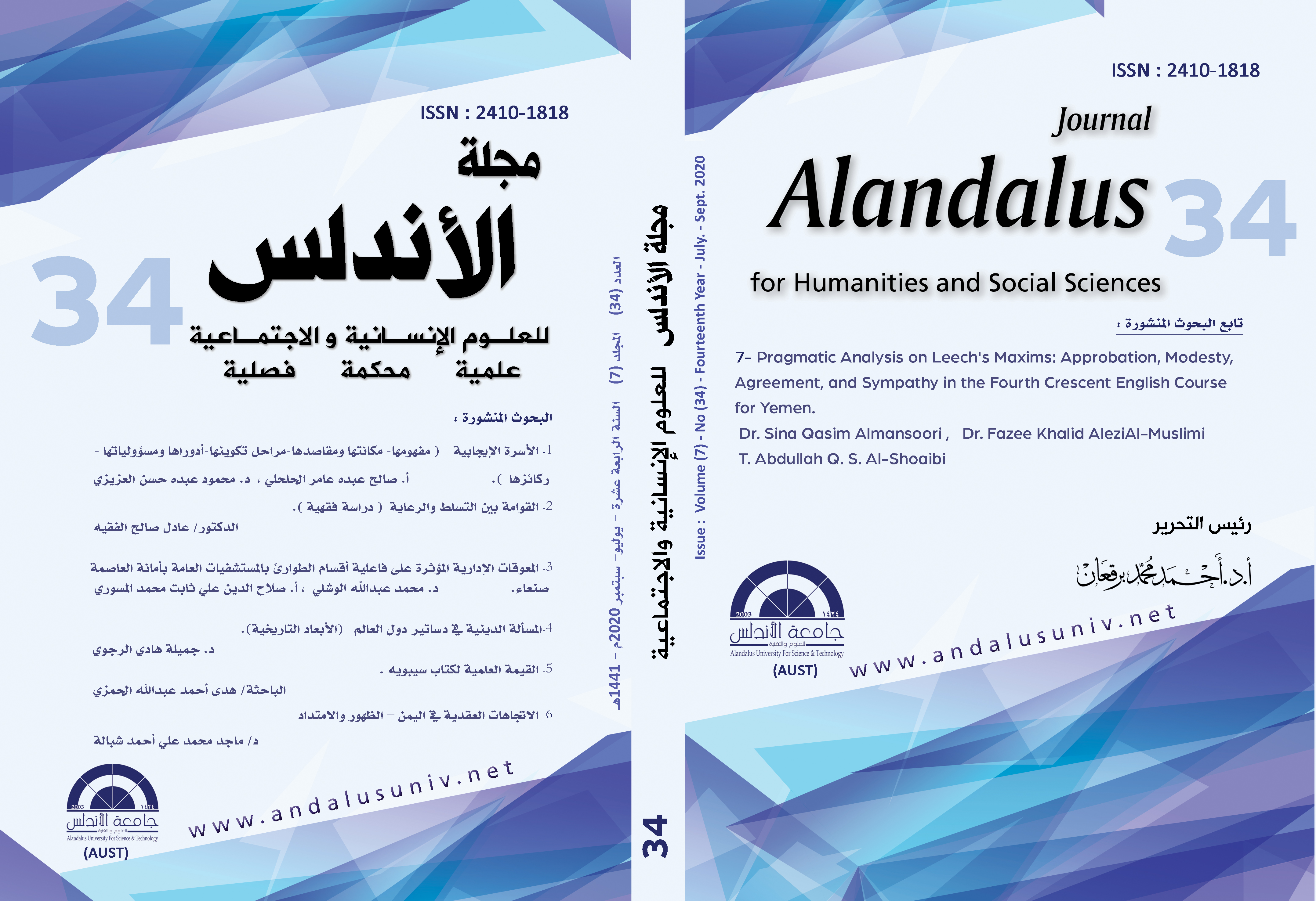تحليل براجماتي لكتاب اللغة الإنجليزية الرابع للصف الأول الثانوي في الجمهورية اليمنية طبقا لأقوال ليتش والمتعلقة ب: مبادئ الاستحسان، التواضع، الاتفاق، والتعاطف Dr. Sina Qasim Almansoori (1) Dr. Fazee Khalid AleziAl-Muslimi (2) T. Abdullah Q. S. Al-Shoaibi (3)
محتوى المقالة الرئيسي
الملخص
This research aimed at discovering the polite and impolite expressions regarding the approbation, modesty, agreement and sympathy maxims of Leech (1983) in the conversations in the Fourth Crescent English Course for Yemen taught in Yemeni Secondary Schools. It also aimed at interpreting them and how the violations of those maxims of Leech happen in the contexts of politeness principle in the conversation Textbook 4. It is a descriptive qualitative and analytical, in which the information was collected from the related literature, previous studies and the Crescent English textbook 4. This research used the content analysis of the fourth Crescent English Course for Yemen as the sources of data. The most important findings of this research revealed that the agreement maxim and approbation maxim of Leech's politeness principle are highly used, while the modesty and sympathy are rarely used in the textbook 4. The identifiable Leech maxims are 13 approbation data, 4 modesty data, 20 agreement data and 4 sympathy data employed in the conversations of the Crescent Textbook 4. The violations of maxims are found in one data of the approbation maxim and in 7 data of the agreement maxims in the textbook, while the violations of the modesty and sympathy maxims are not found in the textbook.
Keywords: Pragmatics, Leech's Maxims, Politeness, Crescent Textbook 4.
تفاصيل المقالة
المراجع
References
Brown, P. (2015). Politeness and language. International Encyclopedia of the Social & Behavioral Sciences, 18(2), 326-330.
Budiarta, W. and Rajistha, G. (2018). Politeness in "Adit Dan SopoJarwo" animation. Lingua Cultura, 12(1), 25-30.
Crystal, D. (1985). A dictionary of linguistics and phonetics (2nded.). Oxford: Wiley-Blackwell.
Erlinawati, A. (2016). A pragmatic analysis of politeness principles on dispreferred second turns performed by the main characters in the movie The Duchess. Unpublished Master Thesis, UniversitasNegeri Yogyakarta.
Foley, W. (1997). Anthropological linguistics: An introduction. UK: Wiley-Blackwell.
Fraser, B. (1990). Perspectives on politeness. Journal of Pragmatics, 14(2), 219-236.
Handayani, T. (2013). Violating politeness principles in cellular phone provider. Lantern (Journal on English Language, Culture and Literature, 2(3), 1-10.
Holmes, J. (2001). An Introduction to Sociolinguistics. Edinburgh: Longman.
Ismet, M. (2014). AspekSopanSantunUjaranDalam Film Eat Pray Love karyaRyan Murphy. Unpublished Master Thesis, FakultasIlmuBudayaUniversitas Sam Ratulangi, Ratulangi.
Janson, T. (2012). The History of Language: An Introduction. Oxford: Oxford University Press.
Kawai, M. (2013). The application of politeness theory into English education in Japan. Unpublished Master Thesis, Linköping University.
Khorshidi, H. (2013). Politeness in study abroad. International Research Journal of Applied and Basic Sciences, 5 (3), 324-333.
Kingwell, M. (1993). Is it rational to be polite? Journal of Philosophy, 90 (8), 387–404.
Kurniasih, N. (2017). An analysis of politeness maxims found in Harry Potter movie based on Leech principle. Unpublished Master Thesis, the State Islamic Institute of Surakarta, Indonesia.
Lakoff, R. (1973). The logic of politeness; or, minding for p's and q's. Papers from the Ninth Annual Meeting of the Chicago Linguistics Society, 292-305. Chicago: Chicago Linguistic Society.
Leech, G. (1983).Principles of pragmatics. New York: Longman.
Lestari, D. P. (2014). An analysis of politeness language patterns in request used in the English textbooks of second grade of Junior High school. Unpublished Master Thesis, Faculty of Teacher Training and Education, University of Bengkulu, Indonesia.
Lestari, P. (2013). A pragmatic analysis of Leech's maxim found in the princess and the frog movie script. Unpublished Article, Muhammadiyah University of Surakarta.
Levinson, S. (1987). Pragmatics. Cambridge: Cambridge University Press.
Meier, A. (1995). Defining politeness: Universality in appropriateness. Language Sciences, 17, 345-365.
Morris, C. (1937). Logical positivism, pragmatism, and Scientific empiricism. Paris: Hermann.
Muhaiminah, H. )2013). The violations of politeness principle in humorscenes of lovely complex comic series. Unpublished Paper. Islamic StateUniversitySunanKalijaga, Yogyakarta.
Noviani, Q. (2014). A pragmatic analysis of politeness strategies and politeness principles in Uptown girls. Unpublished Master Thesis, Yogyakarta State University.
Nurdianingsih, E. (2006). An analysis of tact and approbation maxims based on Leech’s politeness principles in the movie “Maid in Manhattan” (a pragmatics study). Unpublished MasterThesis, SebelasMaret University, Surakarta.
Prihatini, Y. 2006. An analysis of the violations of politeness principle usedin English conversation in Donald Duck Comic. Unpublished Paper, Muhammadiyah University, Surakarta.
Rashid, B. N., and Hattab, H. A. (2016), Theoretical study of the politeness principle and its effects on literary discourse. Special issue of the international scientific conference at the University of Baghdad /College of Education,Al-Ustath, 1, 101-110.
Said, N. (2011). Politeness strategies in requests: The case of Elfhoul speech community. Unpublished Master Thesis, AboubakrBelkaid University,Tlemcen.
Sandra, A. (2010). A politeness maxim analysis on the dialogue of datenight movie. Unpublished Master Thesis, State Islamic University Syarif, Jakarta.
Saputri, R.)2017). The violation of politeness principles in Monster University Movie. UnpublishedPaper, Islamic StateUniversity SunanKalijaga, Yogyakarta.
Scarcella, R. and Brunk, J. (1981). On speaking politely in a second language. In J. Walters and J. Fishman (Eds). The sociolinguistics of deference and politeness. London: Mouton Publishers.
Sifianou, M. (2000). Politeness phenomena in England and Greece: A cross-cultural perspective. Oxford: Clarendon Press.
Yule, G. (1996). Pragmatics. Oxford: Oxford University Press.

